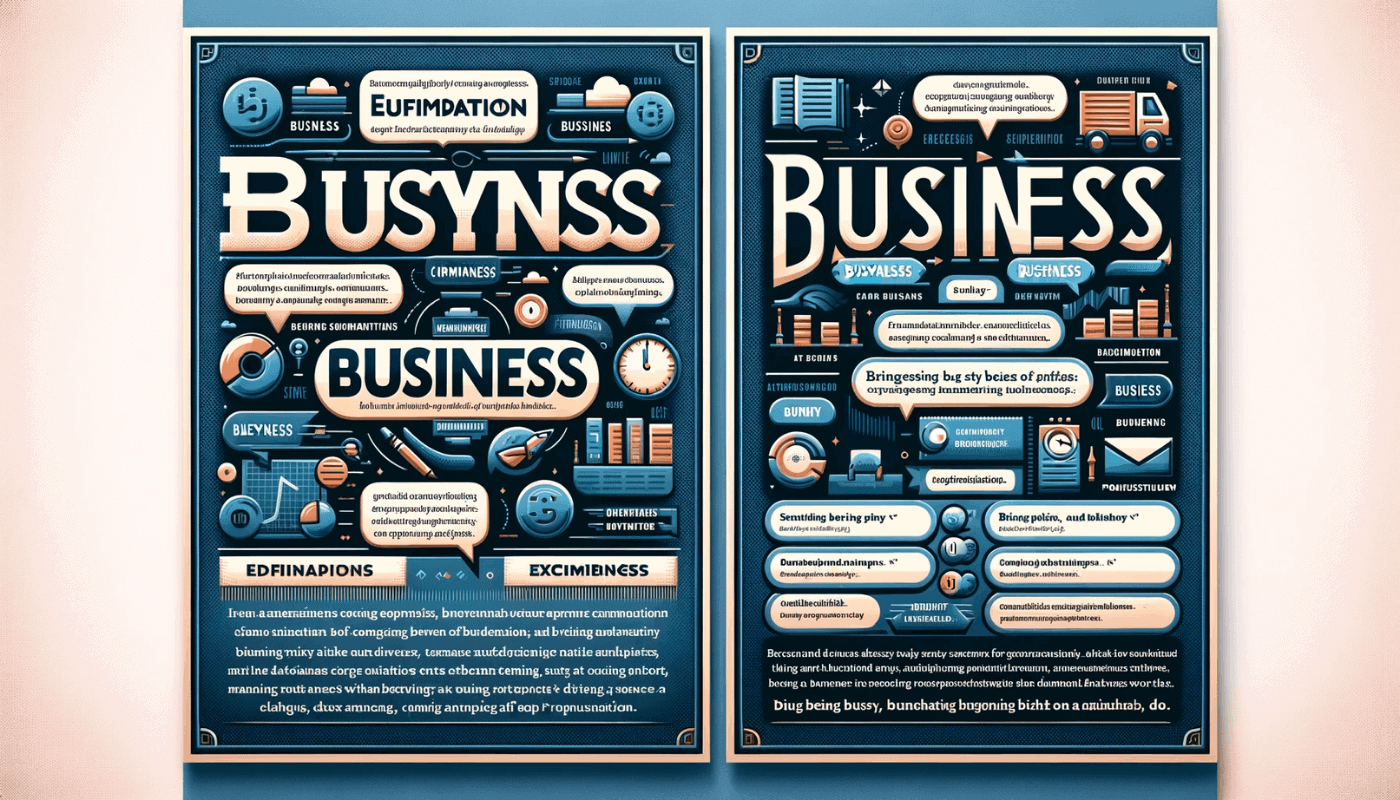
The words busyness & business have very similar spelling, but different meaning. Busyness is a state of having too much to do. Business is when people make, buy, or sell things or provide services to others to make money.
In today’s fast-paced society, the terms “busyness” and “business” are frequently used, often interchangeably, to describe various aspects of our professional and personal lives. Upon closer examination, it becomes clear that these two words carry distinct meanings and implications. Understanding the difference between busyness and business is crucial for effectively managing our time, activities, and overall productivity.
In this article, we will delve into the definitions of busyness and business, exploring the contexts in which they are used and uncovering the similarities and differences between the two. We will identify synonyms for both terms and provide sentence examples to illustrate their usage.
What Is The Definition Of Busyness?
Busyness is a state of being excessively occupied or engaged in various activities, often leading to a feeling of being overwhelmed by the numerous tasks and obligations.
This widespread phenomenon is often seen as a badge of honor in today’s society, where time management is crucial for balance, but it can also lead to negative implications for individuals. The constant juggle between work, family, social commitments, and personal endeavors can result in heightened stress levels and compromise mental well-being. While productivity is vital, finding a healthy equilibrium between a busy schedule and self-care is essential for overall work-life balance.
In What Context Is Busyness Used?
“Busyness” is typically used in contexts where there is a focus on the state of being actively engaged in tasks or activities, often to the point of having a very full schedule. This term is frequently applied in scenarios where individuals or groups are occupied with a multitude of tasks, creating a sense of constant activity or even hecticness.
For example, in a professional setting, one might refer to the “busyness of the office” to describe a high-paced work environment filled with ongoing projects and deadlines. Similarly, in personal life, someone might talk about the “busyness of daily life” when discussing their routine filled with various responsibilities, such as family, work, and social commitments.
What Is The Definition Of Business?
Business refers to the organized efforts and activities aimed at producing goods, providing services, or conducting trade and commerce in order to generate profits and achieve sustainable growth within a specific industry or market.
It encompasses various disciplines such as entrepreneurship, management, corporate strategy, and market analysis.
Entrepreneurship involves the identification of opportunities and the mobilization of resources to create value, while management focuses on the effective coordination of these resources to achieve organizational goals.
In What Context Is Business Used?
The term ‘business‘ is employed across a wide range of contexts, including commercial enterprises, professional interactions, financial transactions, and the broader realm of economic activities, encompassing both corporate operations and individual ventures.
In academic discourse, the term ‘business’ often pertains to the study of organizational management, strategic planning, marketing, and economic principles. It forms the foundation of interdisciplinary fields that delve into the complexities of commerce and trade, addressing topics ranging from ethical considerations to global market dynamics.
Within corporate environments, ‘business’ conveys the operational functions, decision-making processes, and revenue-generating endeavors crucial for sustainable growth and competitive positioning. It encapsulates a spectrum of activities, from procurement and production to sales and customer relations, demonstrating the intricate components essential for a thriving enterprise.
In the global market, ‘business’ represents the interconnected web of international trade, investment flows, and financial exchanges that shape the economic landscape of nations. It encompasses cross-border collaborations, supply chain management, and the diverse cultural and regulatory environments impacting commercial engagements on a global scale.
What Are The Similarities Between Busyness And Business?
Both busyness and business share common attributes related to the management of activities, time, and resources, albeit in distinct contexts and with varying implications on productivity and well-being.
Despite the differences in their settings and goals, both busyness and business entail the strategic allocation of time and resources to accomplish specific objectives. In busyness, the focus may be on juggling numerous tasks and obligations, often leading to a sense of overwhelming activity. Whereas in business, the emphasis is on optimizing operational efficiency and making calculated decisions to drive growth and success.

1. Both Involve Activities
Both busyness and business entail the undertaking of various activities, whether operational tasks in a professional context or personal commitments in a busy lifestyle, signifying the constant engagement and involvement in multiple endeavors.
These activities can range from strategic planning and financial management in a corporate setting to household chores and time management in daily life. In business, professionals are often involved in meetings, negotiations, project management, and customer interactions, each requiring a different skill set and level of attention.
2. Both Require Time Management
Effective time management is a crucial aspect shared by both busyness and business, necessitating the prioritization, scheduling, and allocation of time to optimize productivity and achieve desired outcomes.
For individuals, time management involves setting SMART goals, breaking them down into manageable tasks, and utilizing time tracking techniques to ensure focused efforts. In business, time management encompasses streamlining processes, delegating tasks, and utilizing project management software for efficient task monitoring and resource allocation.
3. Both Can Lead To Productivity
While the impact may vary, both busyness and business have the potential to contribute to productivity, whether through the completion of tasks, accomplishment of goals, or the attainment of favorable outcomes within their respective domains.
Busyness, when managed effectively, can drive productivity by fostering a sense of urgency and a proactive approach to task completion. The inherent pressure to navigate multiple responsibilities can spur individuals to prioritize, organize, and streamline their workflow, leading to efficient time management and enhanced productivity.
What Are Synonyms For The Word Busyness?
Synonyms for the word ‘busyness’ include terms such as activity, hustle, hecticness, flurry, and engagement, all of which convey the sense of being actively occupied or involved in numerous tasks and responsibilities.
The table below has even more synonym examples for “busyness”.
| Synonym | Usage Context |
|---|---|
| Activity | General state of being active or busy. |
| Hustle | Busy movement or activity, often with a sense of urgency. |
| Bustle | A scene of lively activity, usually in a crowded area. |
| Preoccupation | State of being absorbed in thought or busy with something. |
| Occupation | The state of being occupied or engaged with tasks. |
These synonyms encompass the feeling of being occupied, burdened, or overwhelmed by tasks and commitments, depicting a state of constant motion or constant action. The implication of busyness is also akin to workload, bustle, or franticness, portraying a situation of perpetual movement and engagement.
What Are Synonyms For The Word Business?
Synonyms for the word ‘business’ encompass a range of terms such as enterprise, commerce, industry, trade, and operations, all of which encapsulate the diverse aspects of commercial activities, economic endeavors, and organizational operations.
The table below has even more synonym examples for “business”.
| Synonym | Usage Context |
|---|---|
| Enterprise | Refers to an entrepreneurial venture or organization. |
| Company | A legal entity formed for commercial activities. |
| Trade | The act of buying, selling, or exchanging goods or services. |
| Firm | A business partnership or corporation. |
| Venture | A business undertaking, especially one that involves risk. |
We can use expressions like company, corporation, firm, establishment, and venture to refer to activities involving the production, sale, or exchange of goods and services. These terms collectively describe the commercial sector, encompassing various entities, including startups, small and medium-sized enterprises (SMEs), and multinational corporations. They represent the intricate web of economic exchanges, financial transactions, and strategic management, shaping the global economy.
What Are Sentence Examples That Contain ‘Busyness’
Here are 5 sentence examples that contain the word busyness.
- “The busyness of the city streets was overwhelming for the visitors.”
- “Her busyness at work left little time for social activities.”
- “During the holiday season, the busyness of the stores is quite noticeable.”
- “He often complained about the constant busyness of his schedule.”
- “The busyness of the kitchen increased as the dinner rush began.”
Just like we saw in our recent analysis of the phrase “I’m game“, writers need to understand the proper context to use their vocabulary.
What Are Sentence Examples That Contain ‘Business’
Here are 5 sentence examples that contain the word business.
- “She started her own business selling handmade jewelry.”
- “The business meeting lasted longer than expected.”
- “Our family business has been passed down through generations.”
- “The restaurant is a popular business in our neighborhood.”
- “He studied business management in college.”
